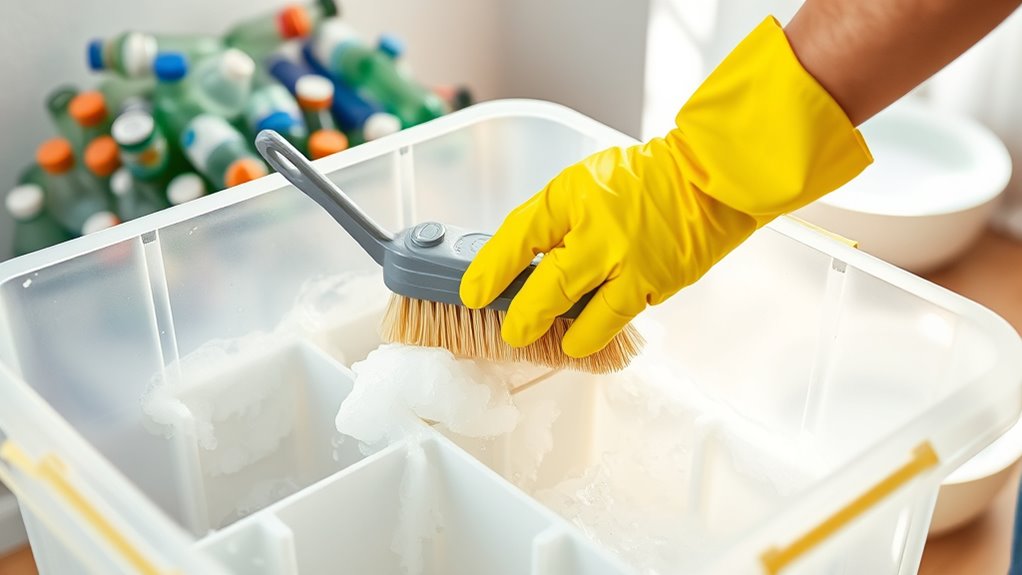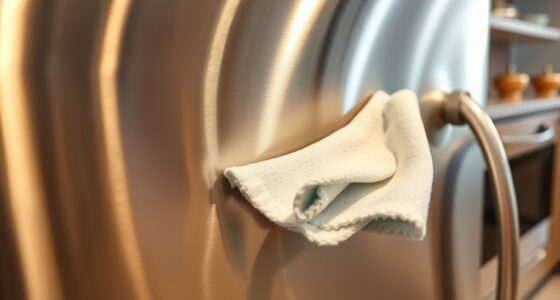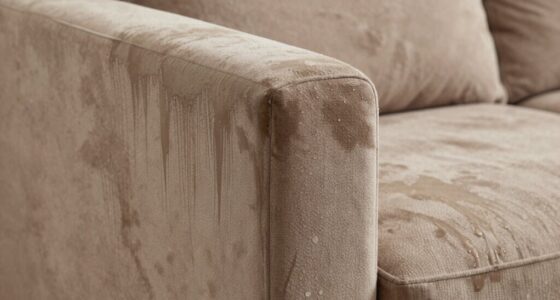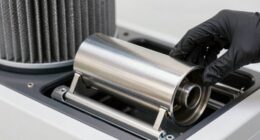To keep recyclable bins odor-free, clean them regularly with eco-friendly methods like rinsing with water and spraying diluted vinegar or sprinkling baking soda at the bottom to absorb moisture and neutralize smells. Make sure to dry the bins thoroughly after washing and consider placing charcoal or coffee grounds inside to trap odors naturally. Maintaining a consistent cleaning routine and preventing wet residue or leftover food will help you avoid unpleasant smells—discover more tips to stay fresh.
Key Takeaways
- Empty and rinse bins regularly to prevent residue buildup and reduce odor formation.
- Use a diluted vinegar solution to disinfect and deodorize the interior thoroughly.
- Place natural odor absorbers like charcoal bags or coffee grounds inside the bin after cleaning.
- Ensure the bin is completely dry before replacing the lid to prevent moisture-related odors.
- Establish a consistent cleaning schedule, including deep cleans with eco-friendly agents, for ongoing freshness.
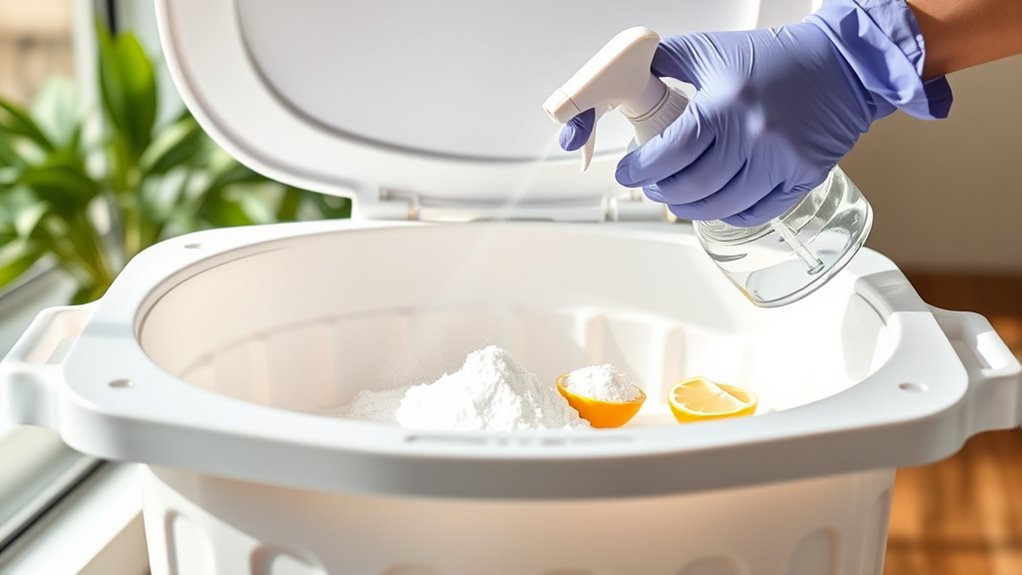
Keeping recyclable bins odor-free can be a challenge, but with the right cleaning routine, you can prevent unpleasant smells from lingering. The key is consistent maintenance and using effective bin deodorizing methods that are also eco-friendly. When you focus on eco friendly cleaning, you not only keep your bins smelling fresh but also reduce your environmental impact.
Start by emptying your bin regularly, ideally every few days. This prevents buildup of residues that cause odors. Rinse the bin with water to remove loose debris and prevent mold or bacteria growth. After rinsing, sprinkle a layer of baking soda at the bottom of the bin. Baking soda is a natural deodorizer that absorbs moisture and neutralizes odors without harmful chemicals. Let it sit for a few minutes before scrubbing with a brush or sponge. This simple step is an effective bin deodorizing technique that keeps smells at bay.
For a deeper clean, consider using a mixture of eco friendly cleaning agents. Vinegar diluted with water makes an excellent disinfectant and deodorizer, killing bacteria that contribute to bad odors. Spray or wipe the inside of your bin thoroughly with this solution, paying attention to corners and seams where dirt can accumulate. Once cleaned, rinse the bin again with water and dry it with a cloth or towel. Drying is essential; moisture can promote mold growth and worsen odors.
To enhance odor control, you can place natural odor absorbers inside your bin. Charcoal bags or coffee grounds are both effective and eco-friendly options. Charcoal is known for its ability to absorb odors, and coffee grounds help trap smell particles. Place these inside the bin after cleaning and deodorizing to maintain freshness between cleanings.
Additionally, establishing a routine of regular cleaning and deodorizing can make a big difference. Consider cleaning your bins weekly or biweekly, especially in warmer months when odors tend to develop faster. Never leave wet or leftover food scraps in your bins, as these are prime sources of bacteria and smell. Also, make sure your recycling is rinsed or wiped clean before placing it in the bin to minimize residue. Incorporating automation in waste management can further streamline your cleaning routine and ensure consistent odor control.
Frequently Asked Questions
Can I Use Bleach to Clean Recyclable Bins?
You can use bleach to clean recyclable bins, but you should do so carefully due to bleach safety concerns. Dilute it properly and avoid mixing with other chemicals. If you’re worried about harsh chemicals, consider alternative disinfectants like vinegar or hydrogen peroxide, which are effective and safer for the environment. Always rinse thoroughly after cleaning, and guarantee good ventilation to avoid strong fumes.
How Often Should I Clean My Recyclable Bins?
You should clean your recyclable bins at least once a week to keep odors at bay and prevent messes that could rival a landfill! Incorporate a bin deodorizer during your cleaning schedule to eliminate lingering smells and keep your space fresh. Skipping weekly cleaning can turn your bin into a breeding ground for bacteria and bad odors. Stay vigilant, and your bins will stay clean, odor-free, and fresh!
Are There Eco-Friendly Cleaning Options?
Yes, there are eco-friendly cleaning options you can use. You can choose biodegradable detergents that break down naturally and are gentle on the environment. Additionally, natural deodorants like baking soda or essential oils work well to neutralize odors without harmful chemicals. These options are safe, effective, and help you maintain clean recyclable bins while reducing your ecological footprint. Give them a try for a greener cleaning routine.
How Do I Prevent Mold Growth in Bins?
To prevent mold growth in your bins, you should regularly rinse them with a solution of water and white vinegar, which helps with odor control and mold prevention. Keep the bins dry by airing them out after cleaning, and avoid overfilling to reduce moisture buildup. Consider using a dehumidifier nearby or placing silica gel packs inside to absorb excess moisture, ensuring your bins stay mold-free and odor-free.
What Should I Do if My Bin Still Smells After Cleaning?
If your bin still smells after cleaning, try bin deodorizing by sprinkling baking soda at the bottom and letting it sit overnight. You can also use odor masking sprays or natural options like vinegar or citrus peels. Rinse thoroughly and guarantee proper ventilation. Regularly repeating these steps keeps odors at bay and maintains a fresh-smelling bin, making your recycling experience more pleasant.
Conclusion
Now that you’ve mastered the art of odor-free recycling, your bins will smell so fresh, even your nosiest neighbor might think you’ve swapped your trash for a spa treatment. Just remember, a little effort keeps your bins from turning into a biohazard comedy show. So go ahead, clean like a pro, and enjoy the sweet scent of victory—because nothing says “responsible adult” like a bin that doesn’t smell like last week’s leftovers.

